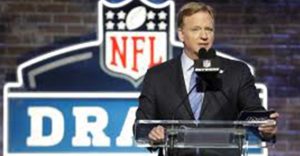#NNPA BlackPress
Solange Curates Powerful Performances of Black Joy and Pain at Brooklyn Academy of Music for the “Eldorado Ballroom” Performance Series
ABOVE: Archie Shepp, center, performs at “The Cry of My People,” backed by a nine-piece ensemble. (Photo By Jeenah Moon) When alto saxophonist Angélla Christie strode onstage on Friday night (Apr. 7) at the Brooklyn Academy of Music, she was joined only by a piano player. But Christie, one of the more prominent instrumentalists in […]
The post Solange Curates Powerful Performances of Black Joy and Pain at Brooklyn Academy of Music for the “Eldorado Ballroom” Performance Series first appeared on BlackPressUSA.

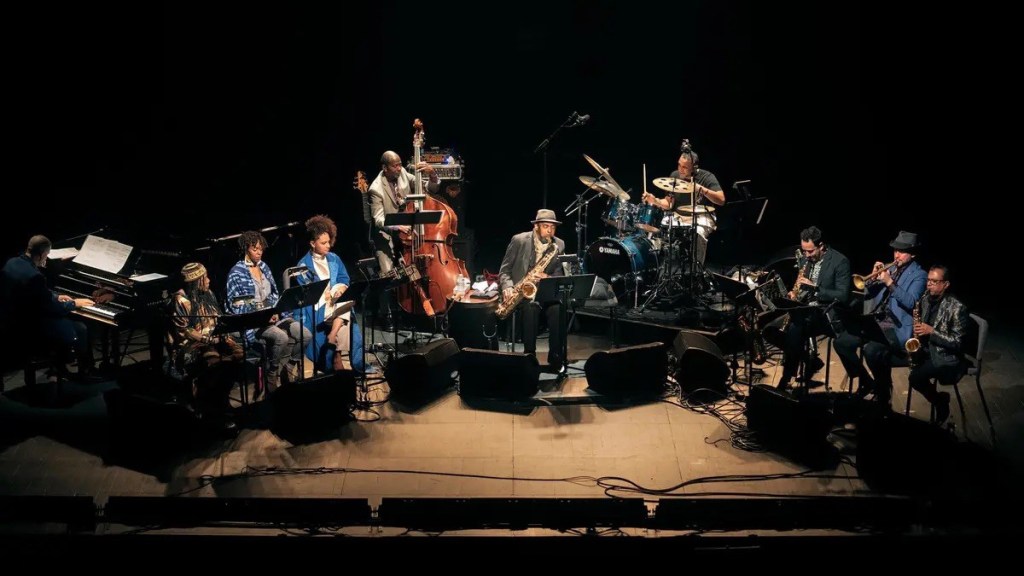
ABOVE: Archie Shepp, center, performs at “The Cry of My People,” backed by a nine-piece ensemble. (Photo By Jeenah Moon)
When alto saxophonist Angélla Christie strode onstage on Friday night (Apr. 7) at the Brooklyn Academy of Music, she was joined only by a piano player. But Christie, one of the more prominent instrumentalists in contemporary gospel, was at full throttle from the very first note — playing in high-gloss, reverb-drenched ostinatos — and within moments, the crowd had become her rhythm section, clapping along on every off-beat.
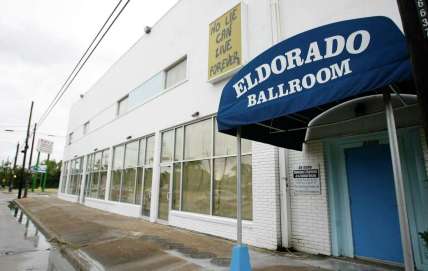
Eldorado Ballroom in the heart of Third Ward Houston, Texas
An usher got swept up while walking a couple to their seats, and on her way back up the aisle she shimmied a bit, her right hand flying into the air in a testifying motion. A woman sitting at the end of Row H reached out for a high five, and their palms gripped each other for a moment.
It was just a few minutes into “Glory to Glory (A Revival for Devotional Art)” — part of BAM’s multidimensional “Eldorado Ballroom” series, brilliantly curated by Solange via her Saint Heron agency — and already something was hitting different.
After Christie, the concert continued with two more sets: selections from Mary Lou Williams’s religious suites, delivered by the 14-person Voices of Harlem choir and a pair of virtuoso pianists, Artina McCain and Cyrus Chestnut; and a roof-raising show from the indomitable Clark Sisters, the best-selling band in gospel history and a fixture of Black radio since the 1980s.
That’s a lot already: a stylistic tour of Black American religious music, mostly in the hands of women, going back more than 50 years. But “Eldorado Ballroom” was aiming for even more. Rarely does a single series pull together so many strands — not just of Black music, but of Black creativity writ large — into an open-ended statement, speaking to what might be possible as well as making a comment on how Black creative histories ought to be remembered.
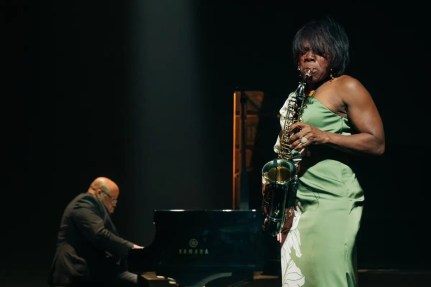
Angélla Christie, right, performs at “Glory to Glory (A Revival for Devotional Art)” at BAM on Friday night. (Photo By Jeenah Moon)
“Eldorado Ballroom” is an extension of the work Solange has been doing for the past 10 years under the auspices of Saint Heron. As she told New York Times magazine’s Craig Jenkins recently, her aim with Saint Heron — whether you call it an agency, a studio, a brand or simply a creative clearinghouse — is “to centralize and build a really strong archive that in 20 years or 30 years can be accessible by future generations to be a guiding light in the same way that so many of my blueprints guided me.”
Thanks to Saint Heron, Solange has managed to put her cultural capital to use while keeping her own celebrity mostly out of view. On Friday, the singer and songwriter sat beaming from an opera box near the stage while the Clark Sisters motored through a 40-plus-year catalog of danceable gospel hits, but she never took a bow.
Saint Heron surfaced in 2013 with the release of a mixtape that helped set the standard for a new wave of outsider R&B. Some of its contributors, like Kelela and Sampha, became stars. Since then, Saint Heron has served as a flexible play space for Solange and her creative community, crossing lines between fashion and design, visual art, publishing, music and dance. Mid-pandemic, Saint Heron released a free digital library of books by Black writers and artists.
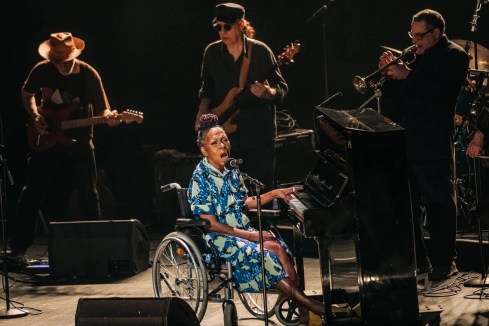
Linda Sharrock sang as part of “The Cry of My People” on Saturday night at BAM. Her last show in New York City before this past weekend was in 1979; she has suffered health setbacks including a stroke. (Photo By Jeenah Moon)
And clearly, Solange has gained the attention of a broad, young, literary community of color. The capacity crowd at “Glory to Glory” on Friday was — unlike at most events in such spaces — about 90 percent Black, and as diverse in age and attire as Flatbush Avenue on any spring afternoon. Twenty-somethings in custom streetwear stood cheering next to older women in their Sunday’s best.
On Saturday, the crowd again skewed under 50 and majority Black for “The Cry of My People,” a night devoted to poetry and experimental jazz. If “Glory to Glory” was a celebration of how “triumphant and safe” gospel music can make a person feel, as Solange put it to Jenkins — a night devoted to joy, basically — then “The Cry of My People” was a confrontation of pain.
The show began with a reading from the poet Claudia Rankine, who stood at center stage as the curtain came up, then read two poems: “Quotidian (1),” about inner turmoil, and “What If,” about a kind of exhausted rage. The second included the line: “in the clarity of consciousness, what if nothing changes?”
Rankine had put words to something that the next performer, vocalist Linda Sharrock, would express without them. Sharrock has been heavily respected in jazz circles since the 1960s for her raw and riveting use of extended vocal techniques: Moans, breaths and cries have been her musical units. But like so many women in jazz, she spent the peak years of her career in the shadow of a more famous husband, guitarist Sonny Sharrock, and ultimately quit the scene. Before Saturday, her last show in New York City had been in 1979. In more recent years she has suffered health setbacks including a stroke that left her aphasic, and has performed only rarely.
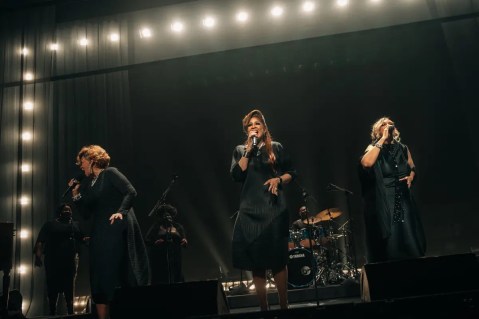
The Clark Sisters onstage at BAM on Friday night, as part of a bill celebrating Black American religious music. (Photo By Jeenah Moon)
At BAM, backed by a signal-scrambling, free-improvising, eight-piece band, Sharrock sat in a wheelchair beside an upright piano (that she often touched but hardly played) and sang in big, open vowel sounds. They felt confounding, yet clear. Most of the time, the sounds came in wide, billowing arcs; when she held a single, steady note — sometimes spiked with a growl — it brought the urgency to an almost unbearable level. Often there were hints at a secondary feeling (surprise? anger? wonder? all possible) but the main message was consistent: pain.
The backstage crew seemed to have difficulty following the band’s cues, and after the curtain had been down for a solid three minutes following Sharrock’s set, it came back up. The band was still playing. Sharrock performed another mini-set before a long wait for the curtain to come down once again. Maybe a clean ending wouldn’t have fit. The crowd — dazed, moved — gave Sharrock a warm response, but there was little that felt “triumphant and safe” about this night.
It concluded with a set from Archie Shepp, the luminary tenor saxophonist, composer, vocalist and writer. A disciple of John Coane and Cecil Taylor, Shepp became a leading advocate for Black musicians’ right to self-determination in the 1960s and has hardly quieted his voice ever since. At 85, his saxophone chops have faded, and he needed help from other band members to bring the instrument into playing position, but the whispered notes he did get out of the horn carried fabulous amounts of weight.
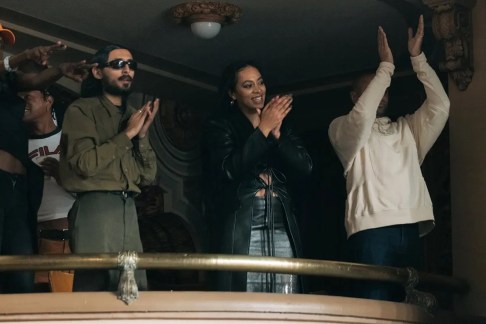
Solange, middle, attends “Glory to Glory (A Revival for Devotional Art)” at BAM on Friday night. The singer and her Saint Heron agency curated the series, “Eldorado Ballroom.” (Photo By Jeenah Moon)
Backed by a nine-piece ensemble featuring three excellent vocalists (Amina Claudine Myers, Sarah Elizabeth Charles and Pyeng Threadgill) and a pithy, three-man horn section, Shepp pulled from across his broad repertoire. He revisited his classic cover of Calvin Massey’s stout, dirgelike “Cry of My People,” and the swiveling rock beat of “Blues for Brother George Jackson” from the “Attica Blues” LP. On Duke Ellington’s gospel standard “Come Sunday,” Shepp sang in an earnest baritone while Myers, who briefly took over the piano chair from Jason Moran, splashed him with generous harmonies. As Shepp sang the line, “God of love, please look down and see my people through,” the house erupted in a wave of support.
His set, like his six-decade-long career, was a reminder that the walls that divide spiritual music, popular music and art music can often be arbitrary. “Where did they come from, anyway?” he seemed to ask. This, you could say, was the message of “Eldorado Ballroom” writ large.
The series takes its name from a once-legendary venue in Houston’s Third Ward neighborhood, where Solange grew up. At the ’Rado, as it was known, jazz, gospel and soul — art, spiritual and popular — all appeared on the same stage, until an economic downturn and a pattern of police repression forced the venue to close in 1972.
The night that Solange’s series kicked off — March 30, with a show featuring the outsider-R&B trifecta of Kelela, keiyaA and Res — the actual Eldorado Ballroom was celebrating its grand reopening in Houston, after a nearly $10 million restoration project. With a little luck, Houston may have its own “Eldorado Ballroom” series soon, too.
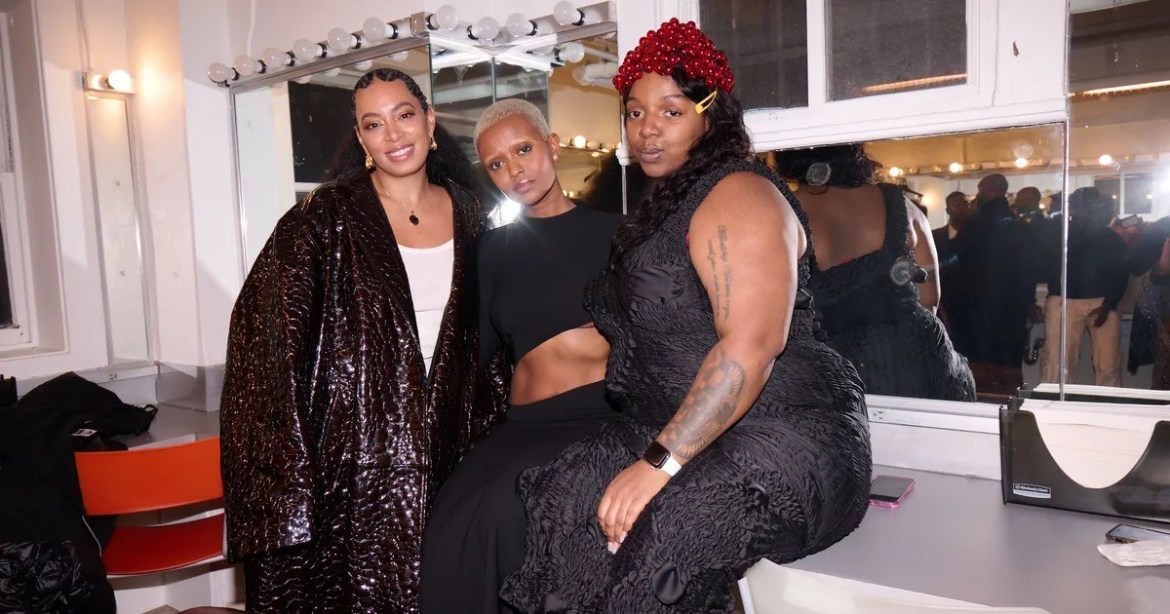
Solange pictured with artists Kelela (middle) and KeiyaA (right) at BAM
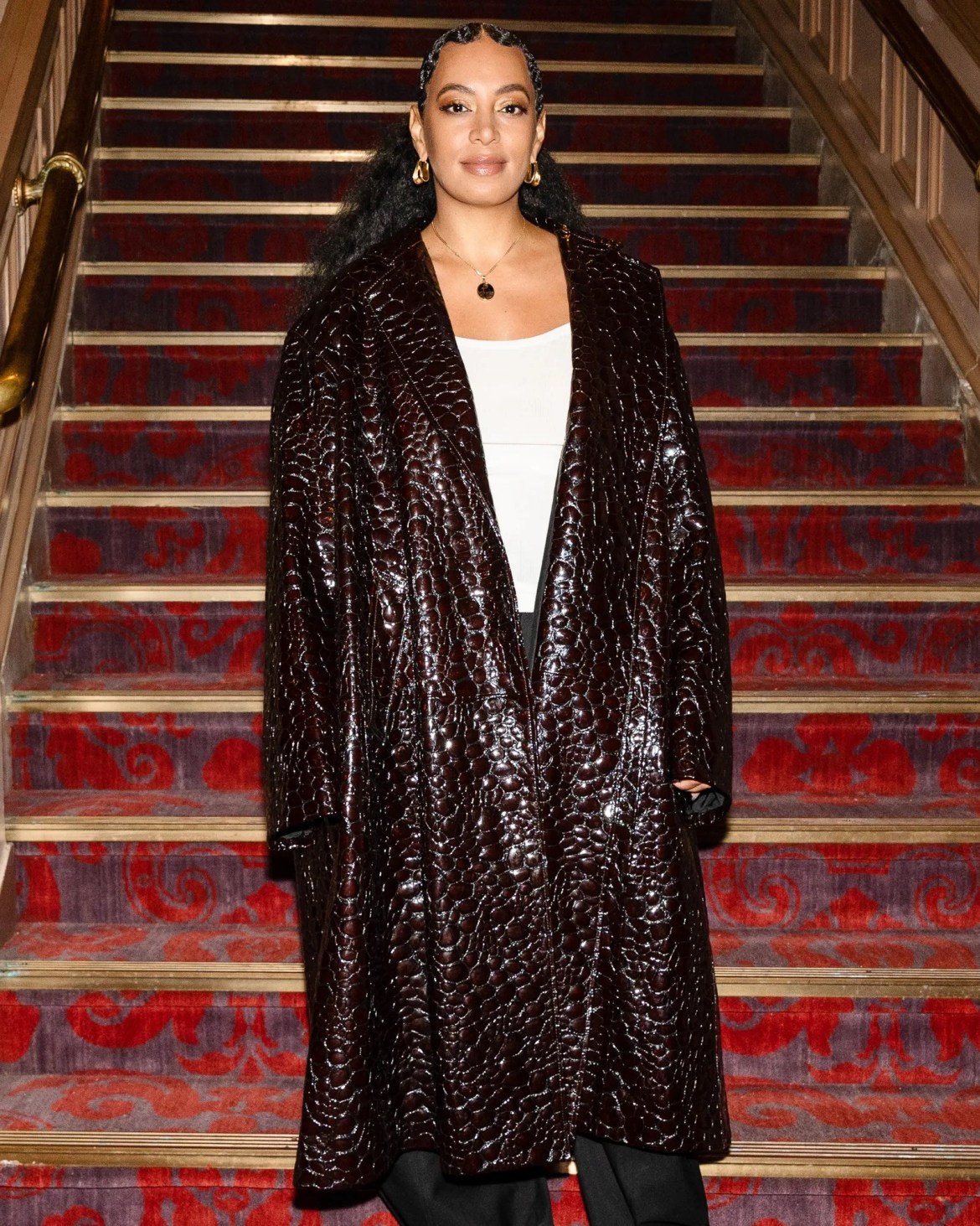
Solange Knowles at the Brooklyn Academy of Music on March 30, 2023 (Photo By Bre Johnson)
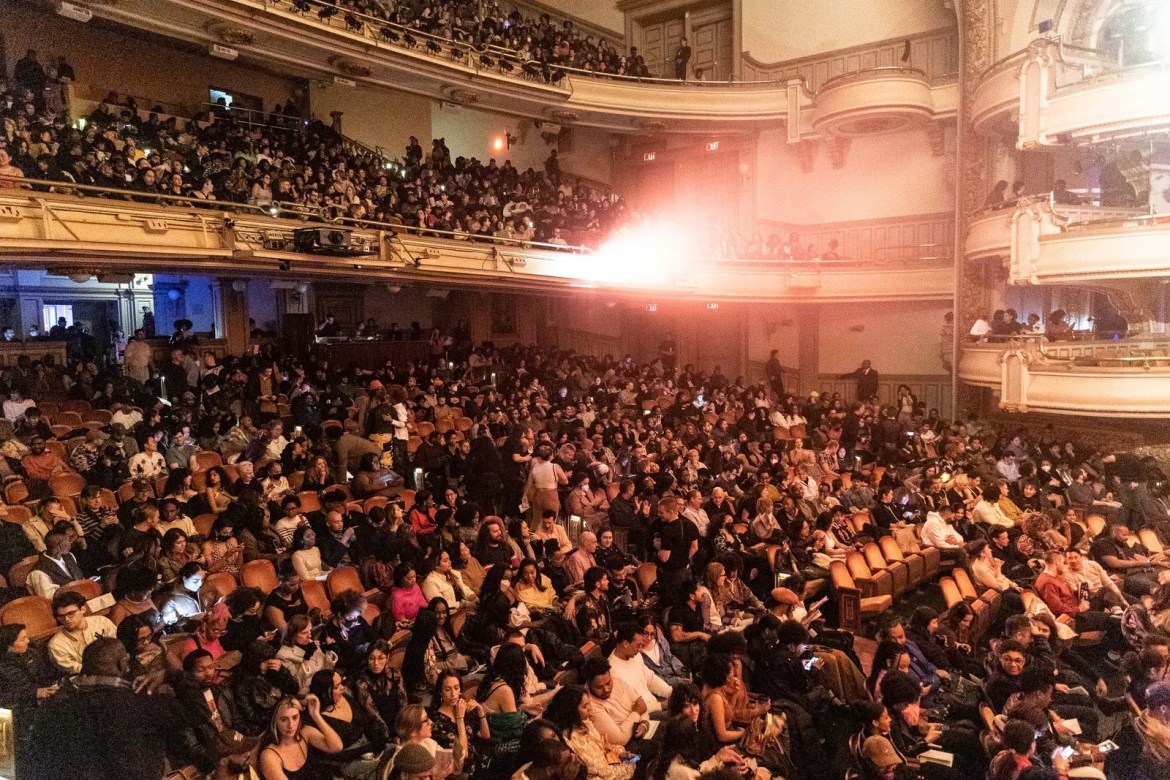
Opening Night of Solange and Saint Heron’s Eldorado Ballroom at BAM (Photo By Bre Johnson)
The post Solange Curates Powerful Performances of Black Joy and Pain at Brooklyn Academy of Music for the “Eldorado Ballroom” Performance Series appeared first on Houston Forward Times.
The post Solange Curates Powerful Performances of Black Joy and Pain at Brooklyn Academy of Music for the “Eldorado Ballroom” Performance Series first appeared on BlackPressUSA.
#NNPA BlackPress
A Nation in Freefall While the Powerful Feast: Trump Calls Affordability a ‘Con Job’
BLACKPRESSUSA NEWSWIRE — There are seasons in this country when the struggle of ordinary Americans is not merely a condition but a kind of weather that settles over everything.

By Stacy M. Brown
Black Press USA Senior National Correspondent
There are seasons in this country when the struggle of ordinary Americans is not merely a condition but a kind of weather that settles over everything. It enters the grocery aisle, the overdue bill, the rent notice, and the long nights spent calculating how to get through the next week. The latest numbers show that this season has not passed. It has deepened.
Private employers cut 32,000 jobs in November, according to ADP. Because the nation has been hemorrhaging jobs since President Trump took office, the administration has halted publishing the traditional monthly report. The ADP report revealed that small businesses suffered the heaviest losses. Establishments with fewer than 50 workers shed 120,000 positions, including 74,000 from companies with 20 to 49 workers. Larger firms added 90,000 jobs, widening the split between those rising and those falling.
Meanwhile, wealth continues to climb for the few who already possess most of it. Federal Reserve data shows the top 1 percent now holds $52 trillion. The top 10 percent added $5 trillion in the second quarter alone. The bottom half gained only 6 percent over the past year, a number so small it fades beside the towering fortunes above it.
“Less educated and poorer people tend to make worse mistakes,” John Campbell said to CBS News, while noting that the complexity of the system leaves many families lost before they even begin. Campbell, a Harvard University economist and coauthor of a book examining the country’s broken personal finance structure, pointed to a system built to confuse and punish those who lack time, training, or access.
“Creditors are just breathing down their necks,” Carol Fox told Bloomberg News, while noting that rising borrowing costs, shrinking consumer spending, and trade battles under the current administration have left owners desperate. Fox serves as a court-appointed Subchapter V trustee in Southern Florida and has watched the crisis unfold case by case.
During a cabinet meeting on Tuesday, Trump told those present that affordability “doesn’t mean anything to anybody.” He added that Democrats created a “con job” to mislead the public.
However, more than $30 million in taxpayer funds reportedly have supported his golf travel. Reports show Kristi Noem and FBI Director Kash Patel have also made extensive use of private jets through government and political networks. The administration approved a $40 billion bailout of Argentina. The president’s wealthy donors recently gathered for a dinner celebrating his planned $300 million White House ballroom.
During an appearance on CNBC, Mark Zandi, an economist, warned that the country could face serious economic threats. “We have learned that people make many mistakes,” Campbell added. “And particularly, sadly, less educated and poorer people tend to make worse mistakes.”
#NNPA BlackPress
The Numbers Behind the Myth of the Hundred Million Dollar Contract
BLACKPRESSUSA NEWSWIRE — Odell Beckham Jr. did not spark controversy on purpose. He sat on The Pivot Podcast and tried to explain the math behind a deal that looks limitless from the outside but shrinks fast once the system takes its cut.

By Stacy M. Brown
Black Press USA Senior National Correspondent
Odell Beckham Jr. did not spark controversy on purpose. He sat on The Pivot Podcast and tried to explain the math behind a deal that looks limitless from the outside but shrinks fast once the system takes its cut. He looked into the camera and tried to offer a truth most fans never hear. “You give somebody a five-year $100 million contract, right? What is it really? It is five years for sixty. You are getting taxed. Do the math. That is twelve million a year that you have to spend, use, save, invest, flaunt,” said Beckham. He added that buying a car, buying his mother a house, and covering the costs of life all chip away at what people assume lasts forever.
The reaction was instant. Many heard entitlement. Many heard a millionaire complaining. What they missed was a glimpse into a professional world built on big numbers up front and a quiet erasing of those numbers behind the scenes.
The tax data in Beckham’s world is not speculation. SmartAsset’s research shows that top NFL players often lose close to half their income to federal taxes, state taxes, and local taxes. The analysis explains that athletes in California face a state rate of 13.3 percent and that players are also taxed in every state where they play road games, a structure widely known as the jock tax. For many players, that means filing up to ten separate returns and facing a combined tax burden that reaches or exceeds 50 percent.
A look across the league paints the same picture. The research lists star players in New York, Philadelphia, Chicago, Detroit, and Cleveland, all giving up between 43 and 47 percent of their football income before they ever touch a dollar. Star quarterback Phillip Rivers, at one point, was projected to lose half of his playing income to taxes alone.
A second financial breakdown from MGO CPA shows that the problem does not only affect the highest earners. A $1 million salary falls to about $529,000 after federal taxes, state and city taxes, an agent fee, and a contract deduction. According to that analysis, professional athletes typically take home around half of their contract value, and that is before rent, meals, training, travel, and support obligations are counted.
The structure of professional sports contracts adds another layer. A study of major deals across MLB, the NBA, and the NFL notes that long-term agreements lose value over time because the dollar today has more power than the dollar paid in the future. Even the largest deals shrink once adjusted for time. The study explains that contract size alone does not guarantee financial success and that structure and timing play a crucial role in a player’s long-term outcomes.
Beckham has also faced headlines claiming he is “on the brink of bankruptcy despite earning over one hundred million” in his career. Those reports repeated his statement that “after taxes, it is only sixty million” and captured the disbelief from fans who could not understand how money at that level could ever tighten.
Other reactions lacked nuance. One article wrote that no one could relate to any struggle on eight million dollars a year. Another described his approach as “the definition of a new-money move” and argued that it signaled poor financial choices and inflated spending.
But the underlying truth reaches far beyond Beckham. Professional athletes enter sudden wealth without preparation. They carry the weight of family support. They navigate teams, agents, advisors, and expectations from every direction. Their earning window is brief. Their career can end in a moment. Their income is fragmented, taxed, and carved up before the public ever sees the real number.
The math is unflinching. Twenty million dollars becomes something closer to $8 million after federal taxes, state taxes, jock taxes, agent fees, training costs, and family responsibilities. Over five years, that is about $40 million of real, spendable income. It is transformative money, but not infinite. Not guaranteed. Not protected.
Beckham offered a question at the heart of this entire debate. “Can you make that last forever?”
#NNPA BlackPress
FBI Report Warns of Fear, Paralysis, And Political Turmoil Under Director Kash Patel
BLACKPRESSUSA NEWSWIRE — Six months into Kash Patel’s tenure as Director of the Federal Bureau of Investigation, a newly compiled internal report from a national alliance of retired and active-duty FBI agents and analysts delivers a stark warning about what the Bureau has become under his leadership.

Six months into Kash Patel’s tenure as Director of the Federal Bureau of Investigation, a newly compiled internal report from a national alliance of retired and active-duty FBI agents and analysts delivers a stark warning about what the Bureau has become under his leadership. The 115-page document, submitted to Congress this month, is built entirely on verified reporting from inside field offices across the country and paints a picture of an agency gripped by fear, divided by ideology, and drifting without direction.
The report’s authors write that they launched their inquiry after receiving troubling accounts from inside the Bureau only four months into Patel’s tenure. They describe their goal as a pulse check on whether the ninth FBI director was reforming the Bureau or destabilizing it. Their conclusion: the preliminary findings were discouraging.
Reports Describe Widespread Internal Distrust and Open Hostility Toward President Trump
Sources across the country told investigators that a large number of FBI employees openly express hostility toward President Donald Trump. One source reported seeing an “increasing number of FBI Special Agents who dislike the President,” adding that these employees were exhibiting what they called “TDS” and had lost “their ability to think critically about an issue and distinguish fact from fiction.” Another source described employees making off-color comments about the administration during office conversations.
The sentiment reportedly extends beyond domestic lines. Law enforcement and intelligence partners in allied countries have privately expressed fear that the Trump administration could damage long-term international cooperation according to a sub-source who reported those concerns directly to investigators.
Pardon Backlash and Fear of Retaliation
The President’s January 20 pardons of individuals convicted for their roles in the January 6 attack ignited what the report calls demoralization inside the Bureau. One FBI employee said they were “demoralized” that individuals “rightfully convicted” were pardoned and feared that some of those individuals or their supporters might target them or their family for carrying out their duties. Another source described widespread anger that lists of personnel who worked on January 6 investigations had been provided to the Justice Department for review, noting that agents “were just following orders” and now worry those lists could leak publicly.
Morale In Decline
Morale among FBI employees appears to be sinking fast. There were a few scattered positive notes, but the weight of the reporting describes morale as low, bad, or terrible. Agents with more than a decade of service told investigators they feel marginalized or ignored. Some are counting the days until they can retire. One even uses a countdown app on their phone.
Culture Of Fear
Layered over that unhappiness is something far more corrosive. A culture of fear. Sources say Patel, though personable, created mistrust from the start because of harsh remarks he made about the FBI before taking office. Agents took those comments personally. They now work in an atmosphere where employees keep their heads down and speak carefully. Managers wait for directions because they are afraid a wrong move could cost them their jobs. One source said agents dread coming to work because nobody knows who will be reassigned or fired next.
Leadership Concerns
The report also paints a picture of leaders unprepared for the jobs they hold. Multiple sources said Patel is in over his head and lacks the breadth of experience required to understand the Bureau’s complex programs. Some said Deputy Director Dan Bongino should never have been appointed because the role requires deep institutional knowledge of FBI operations. A sub-source recounted Bongino telling employees during a field office visit that “the truth is for chumps.” Employees who heard it were stunned and offended.
Social Media and Communication Breakdowns
Communication inside the Bureau has become another source of frustration. Sources said Patel and Bongino spend too much time posting on social media and not enough time communicating with employees in clear and official ways. Several told investigators they learn more about FBI operations from tweets than from internal channels.
ICE Assignments Raise Alarm
Nothing has sparked more frustration inside the FBI than the orders requiring agents to assist Immigration and Customs Enforcement. The reporting shows widespread resentment and fear over these assignments. Agents say they have little training in immigration law and were ordered into operations without proper planning. Some said they were put in tactically unsafe positions. They also warned that being pulled away from counterterrorism and counterintelligence investigations threatens national security. One sub-source asked, “If we’re not working CT and CI, then who is?”
DEI Program Removal
Even the future of diversity programs became a point of division. Some agents praised Patel’s removal of DEI initiatives. Others said the old system left them afraid to speak honestly because they worried about being labeled racist. The reporting shows a deep and unresolved conflict over whether DEI strengthened the organization or weakened it.
Notable Incidents
The document also details several incidents that have become part of FBI lore. Patel ordered all employees to remove pronouns and personal messages from their email signatures yet used the number nine in his own. Agents laughed at what they saw as hypocrisy. In another episode, FBI employees who discussed Patel’s request for an FBI-issued firearm were ordered to take polygraph examinations, which one respected source described as punitive. And in Utah, Patel refused to exit a plane without a medium-sized FBI raid jacket. A team scrambled to find one and finally secured a female agent’s jacket. Patel still refused to step out until patches were added. SWAT members removed patches from their own uniforms to satisfy the demand.
A Bureau at a Crossroad
The Alliance warns that the Bureau stands at a difficult crossroads. They write that the FBI faces some of the most daunting challenges in its history. But even in despair, a few voices say something different. One veteran source said “It is early, but most can see the mission is now the priority. Case work and threats are the focus again. Reform is headed in the right direction.”
-

 Bay Area3 weeks ago
Bay Area3 weeks agoPost Salon to Discuss Proposal to Bring Costco to Oakland Community meeting to be held at City Hall, Thursday, Dec. 18
-

 Activism3 weeks ago
Activism3 weeks agoMayor Lee, City Leaders Announce $334 Million Bond Sale for Affordable Housing, Roads, Park Renovations, Libraries and Senior Centers
-

 Activism3 weeks ago
Activism3 weeks agoOakland Post: Week of December 10 – 16, 2025
-

 Activism3 weeks ago
Activism3 weeks agoOakland School Board Grapples with Potential $100 Million Shortfall Next Year
-

 Arts and Culture3 weeks ago
Arts and Culture3 weeks agoFayeth Gardens Holds 3rd Annual Kwanzaa Celebration at Hayward City Hall on Dec. 28
-

 Activism3 weeks ago
Activism3 weeks ago2025 in Review: Seven Questions for Black Women’s Think Tank Founder Kellie Todd Griffin
-

 Advice3 weeks ago
Advice3 weeks agoCOMMENTARY: If You Don’t Want Your ‘Black Card’ Revoked, Watch What You Bring to Holiday Dinners
-

 Activism3 weeks ago
Activism3 weeks agoAnn Lowe: The Quiet Genius of American Couture

